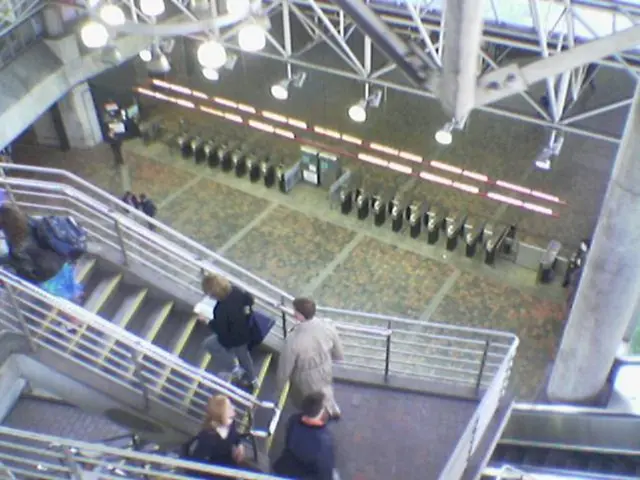Rising reports of anti-Semitic, anti-Arab, and anti-Muslim bias continue to unsettle communities across the United States.
According to the Anti-Defamation League (ADL) and the Council on American-Islamic Relations (CAIR), there's been a concerning surge in such biased incidents. Following the events on October 17, 2023, the ADL recorded 2,031 anti-Semitic incidents over the subsequent two months. These incidents encompassed physical attacks, vandalism, and protests deemed antisemitic, anti-Zionist, or supporting terroristic narratives.
In the same two-month period, the ADL reported 465 anti-Semitic incidents. New data, published on Monday, shows a staggering increase of more than 330% in reported anti-Semitic incidents compared to 2022.
"This is an unprecedented event, but directly related to the conflict between Israel and Hamas, as the majority of these incidents connect in some way to this conflict," commented Jack Hyman, a spokesperson for the Anti-Defamation League.
CAIR, the largest Muslim interest group in the United States, reported a similarly alarming increase in requests for help and reports of anti-Arab and anti-Muslim bias. During the first conflict-related month, CAIR documented a record-breaking surge in prejudiced incidents. Since then, 2,171requests for help and anti-bias reports have been filed with the national headquarters and local chapters by October 7.
The reports included examples of hate crimes, hate speech, workplace discrimination, and incidents categorized as violations of freedom of speech. Corey Saylor, CAIR's Director of Research and Advocacy, described the rise in anti-Arab and anti-Muslim bias as "a cause for alarm".
"From Burlington to Chicago and beyond, innocent Americans are suffering from this wave of bigotry. We fear that Islamophobia and anti-Palestinian racism will continue to spiral out of control if our nation does not challenge violence abroad and reject bigotry at home," Saylor said.
As a result, some Jews in the United States have chosen to modify their Chanukka celebrations in response to the rising anti-Semitism. Others are more assertive in expressing their Jewish identity, despite the increased risks.
Meanwhile, Members of three Palestinian students' families in Vermont shared their concern after the students were shot last month. Although they believed the students would be safer in the U.S. than in the West Bank, they now grapple with uncertainties about the survival of the eldest student and whether the shooting will be investigated as a hate crime.
As the conflict in Israel and Gaza intensifies, extremism experts warn that more should be done to address and combat the surge of prejudice in the United States.
"In the past, we've seen that when a conflict in the Middle East erupts, the number of hate crimes motivated by prejudice – whether antisemitic or anti-Muslim – swiftly rises in the United States," commented Hyman. "It's a chilling reminder of the global impact of wars, even those thousands of miles away."
According to some sources, the number of hate and extremist-motivated incidents has increased, contributing to a climate of fear for many Judaic, Muslim, and Arab communities in the U.S.
References: -
Enrichment Data: The surge in anti-Semitic, anti-Arab, and anti-Muslim bias in the United States is a complex issue driven by historical, ideological, political, and geopolitical factors.
Historical and Ideological Roots: - Antisemitism: With roots in medieval Europe, antisemitism has evolved throughout history. Modern forms include belief in conspiracy theories like the "Protocols of the Elders of Zion" and the demonization of Israel and the Jewish community in media and academia. - Anti-Arab and Anti-Muslim Bias: Often linked to Islamophobia, these biases have increased significantly following the September 11 attacks. Islamophobic sentiment, exploited by far-right politicians, has led to discriminatory legislation and violence against Muslim communities.
Political and Social Rhetoric: - Political Rhetoric: The use of Islamophobic and antisemitic rhetoric by politicians can fuel public resentment, promoting discriminatory attitudes and behaviors. - Social Media and Online Platforms: Online platforms and social media platforms often fail to effectively moderate hate speech, allowing it to spread widely, contributing to the spread of biased attitudes and behaviors.
Geopolitical Tensions: - Middle East Conflicts: Escalation of conflicts in the Middle East, such as the Israel-Hamas conflict, can heighten tensions and feelings of insecurity among communities, leading to an increase in reported incidents of bias.
Impacts: - Increased Fear and Anxiety: Both Jewish and Muslim communities report increased fear and anxiety due to bias-related incidents and discrimination. - Discriminatory Legislation and Policies: Discriminatory legislation and policies based on religious and racial prejudice can have far-reaching societal and economic impacts. - Social and Economic Consequences: The spread of hate speech and discriminatory policies can lead to social and economic consequences, including the targeting of minority-owned businesses and an erosion of social cohesion. - Psychological Trauma: The trauma experienced as a result of bias-related incidents can have significant psychological impacts on communities, including increased rates of mental health disorders and intergenerational trauma.








